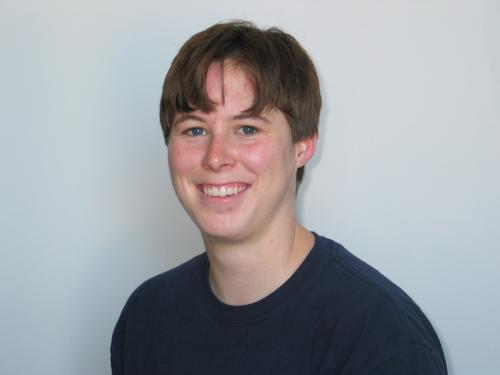Featured Researcher: Bonnie Kirkpatrick
 Research shows that by middle school, many girls have already decided against going into computer science careers. By that time, Algorithms Group student Bonnie Kirkpatrick had learned how to program calculators. She took the one programming class offered at her high school in rural Montana three times — and had taught herself most of the basics in her off–time.
Research shows that by middle school, many girls have already decided against going into computer science careers. By that time, Algorithms Group student Bonnie Kirkpatrick had learned how to program calculators. She took the one programming class offered at her high school in rural Montana three times — and had taught herself most of the basics in her off–time.
This May, she will receive her PhD from UC Berkeley's computer science department, with a focus on algorithms for genetics aimed at deciphering the genetic indicators of both phylogenetic and family relationships. She will go on to a postdoctoral position at the University of British Columbia.
"I'm the wrong person to ask about why there are no women in computer science because I am .... I was always happy with the nerdy environment," she says. But, she adds, the increasingly male cultural associations with computer science may be the reason that fewer women are going into computer science now than 20 years ago, with the majority of college–educated women choosing social sciences, education, and biology instead.
According to the National Center for Women and Information Technology, only a quarter of jobs in technological fields today are held by women, down from 36 percent in 1991 — and those trends start in school. Only 13 percent of high school students who took the AP computer science test in 2009 were female, and the number of incoming university undergraduate women interested in a computer science degree has declined 79 percent over the past decade.
The gender gap has led to efforts designed to bring more women into the field. The Computer Research Association sponsors several programs for women, including Distributed Research Experiences for Undergraduates, formerly the Distributed Mentor Project (DMP). Through DMP, Kirkpatrick worked at Texas A&M for two summers for Professor Nancy Amato, who was the first to suggest that Kirkpatrick go to graduate school.
Last year, Kirkpatrick was one of 32 students in the U.S. awarded a scholarship from Google named in honor of Anita Borg, a pioneer in computer science who encouraged women to pursue careers in technology. In her application essay, Kirkpatrick pointed out computer science's need for "a diverse and cosmopolitan image."
"All the nerdy paraphernalia of computer science is male–gendered," she said — from Mountain Dew to computer games. To increase the number of women in computer science, those cultural associations need to change. She points to a 2009 study from the University of Washington that found that women were less interested in taking computer science courses when there were Star Trek posters on the wall, and more interested when there were nature posters up. Kirkpatrick said, "It's all about women being comfortable in that space" — not necessarily about overt sexism.
Kirkpatrick believes universities also need to make a greater effort to include women in marketing materials, and that popular culture needs to follow suit. Kirkpatrick says that young women are instilled early on with the attitude that "it's just not cool to be a woman computer scientist." Consider the roles women are assigned in television shows like the British IT Crowd, in which the female head of the IT department refuses to learn basic technological principles (such as the use of a Web browser) on the theory that doing so will make her a geek.
Despite universities' efforts to be more inclusive, women still comprise less than a quarter of full–time faculty in computer science in the U.S. — and less than 10 percent of the UC Berkeley EECS faculty. While an undergraduate at Montana State University, Kirkpatrick had no female computer science professors and just one female instructor.
Kirkpatrick's pet peeve is the use of "he" in sentences like "A programmer needs to use all the tools he has." Even at Berkeley, where there's an "underlying value of diversity. professors still assume the typical student is male." This attitude perpetuates the disparities in the field by making female computer scientists more uncomfortable and more likely to leave the field.
The good news, says Kirkpatrick, is that this attitude can be changed if universities focused more on the increasingly interdisciplinary aspects of computer science. Computer science is no longer just about programming — Kirkpatrick's work, for example, has a focus on biology.
"What we need is to change the [male cultural] associations with computer science," she said.
